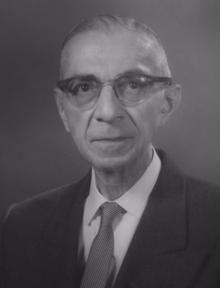Ernst Posner
| Ernst Posner | |
|---|---|
 | |
| Born |
Ernst Maximilian Posner August 9, 1892 Berlin, Germany |
| Died |
April 18, 1980 (aged 87) Germany |
| Occupation | Archivist; Historian |
Ernst Maximilian Posner (9 August 1892 - 18 April 1980) was a Prussian state archivist and a professor of history and archival science at American University in Washington.[1][2]
Early Life and Education
Posner was born into an upper-middle class academic family of Jewish heritage. After attending the University of Berlin, he served the Imperial German Army in World War I on both the Eastern and Western fronts, suffering a severe injury in Poland on December 1915.[3] After the war, he finished his dissertation at the University of Berlin.[1]
Career in Germany
Posner began his professional career working for the Prussian State Privy Archive in 1921.[2] Although exempt from the 1933 civil service laws as a World War I veteran, Posner was fired from the Prussian State Archives in 1935 as a result of the Nuremberg Laws, and interned in the Sachsenhausen concentration camp in November 1938, after the Kristallnacht.[4]
Career in the United States
In 1939, Posner and his wife Käthe managed to flee to the United States via Sweden. With help from archivist Solon Buck, he began teaching archival administration at American University in 1940, and remained there for 21 years.[1] A 1943 lecture of Posner's (later published as "Public Records under Military Occupation") was among the first calls for plans to administer captured German records.[2] In November 1944, Posner prepared a report on the German archival profession, including biographical sketches and estimates of political views, for 72 leading German archivists.[2]:108 For his role in the development of American archival theory and practice, he was sometimes called "the Dean of American archivists."[1] From 1955 to 1956 Posner served as the 11th president of the Society of American Archivists.[5]
In 1972, Posner returned to Europe, settling in Wiesbaden, Germany.[6]
Selected Publications[7]
- Drei Vorträge zum Archivwesen der Gegenwart. Stockholm: Alb. Bonnier, 1940
- American state archives. Chicago; London: University of Chicago Press, 1964
- Archives & the public interest: selected essays. Washington: Public Affairs Press, 1967
- Archives in the ancient world. Cambridge, Mass.: Harvard University Press, 1972. ISBN 9780674044630
Honors
- Since 1983, the Society of American Archivists has been awarding the Ernst Posner Prize for an "outstanding essay dealing with some facet of archival administration, history, theory, and/or methodology that was published during the preceding year in The American Archivist."[8]
- The Ernst Posner building at the German National Archives in Berlin is named after Posner.[9]
References
- 1 2 3 4 Ross, Rodney A. (1981), "Ernst Posner: The Bridge between the Old World and the New", The American Archivist, 44 (4): 304–312, retrieved 2015-04-18
- 1 2 3 4 Eckert, Astrid M. (2012). The Struggle for the Files: The Western Allies and the Return of German Archives After the Second World War. Cambridge University Press. ISBN 978-0-521-88018-3. Retrieved 30 July 2013.
- ↑ Mommsen, Wolfgang A. Ernst Posner, Mittler zwischen deutschem und amerikanischem Archivwesen. Zu seinem 75. Geburtstag. Der Archivar 20 (3), 1967, pp. 217-230.
- ↑ Lehmann, Hartmut; Sheehan, James J. (1991). An Interrupted Past: German-Speaking Refugee Historians in the United States after 1933. Cambridge University Press. p. 75. ISBN 0-521-40326-X. Retrieved 30 July 2013.
- ↑ "Presidents: Society of American Archivists". Society of American Archivists. 2014. Retrieved August 14, 2014.
- ↑ Eckhart G. Franz (2001), "Posner, Ernst Maximilian", Neue Deutsche Biographie (NDB) (in German), 20, Berlin: Duncker & Humblot, pp. 652–653; (full text online)
- ↑ Epstein, Catherine (1993). A Past Renewed: A Catalog of German-Speaking Refugee Historians in the United States After 1933. Cambridge University Press. p. 249. ISBN 978-0-521-44063-9. Retrieved 30 July 2013.
- ↑ "Fellows' Ernst Posner Award". Society of American Archivists. Retrieved 27 December 2013.
- ↑ Bundesarchiv, Berlin-Lichterfelde